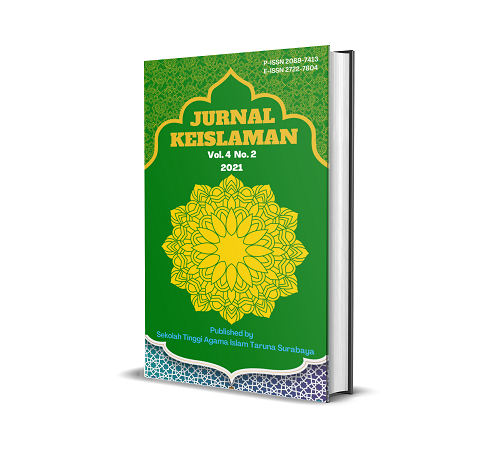HAK ASASI MANUSIA DALAM AL-KULLIYAT AL-KHAMS (PERSPEKTIF PEMIKIRAN ABDURRAHMAN WAHID)
Abstract
Human Rights are one of basic rights that had by every humanbeing who has become their destiny when they were born. Actually theHuman Rights are not state’s gifts, law or other human beings. Every humansneed human rights to protect their dignity, as well as a moral foundation inassociating and dealing each other. In Islam, human rights have a highpriority by prioritizing collective rights rather than individual rights. Islamalso teaches his people to respect each other and recognize the rights of one’slife, because live and death are the power of Allah Almighty. Human Rights inIslam are written in Al-Kulliyat Al-Khams, namely hifzh al-din (protectionagainst religion), hifzh al-nafs (protection of the soul), hifzh al-aql (protectionof reason), hifzh al-nasl (protection of offspring), and hifzh al-maal(protection of property). Abdurrahman Wahid of familiarly known as GusDur is a person who has extremly respect about the human values whichcontained in Al-Kulliyat Al-Khams and shows a high commitment to realize ofrespect for human rights. Therefore, it is very interesting to know HumanRights in Al-Kulliyat Al-Khams, Abdurrahman Wahid’s perspective to find outhow his thoughts in realizing to bring into reality the protection of basichuman rights.Copyright (c) 2021 Majidatun Ahmala

This work is licensed under a Creative Commons Attribution-ShareAlike 4.0 International License.
Authors who publish with this journal agree to the following terms:
- Authors retain copyright and grant the journal right of first publication with the work simultaneously licensed under a Creative Commons Attribution-ShareAlike that allows others to share the work with an acknowledgement of the work's authorship and initial publication in this journal.
- Authors are able to enter into separate, additional contractual arrangements for the non-exclusive distribution of the journal's published version of the work (e.g., post it to an institutional repository or publish it in a book), with an acknowledgement of its initial publication in this journal.
- Authors are permitted and encouraged to post their work online (e.g., in institutional repositories or on their website) prior to and during the submission process, as it can lead to productive exchanges, as well as earlier and greater citation of published work (See The Effect of Open Access).






















